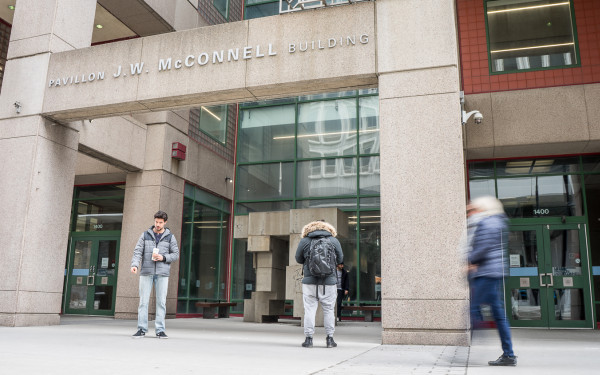More Study Spaces But Fewer Books to Study
Renovation of Webster Library Enters Final Phase
New study spaces have opened in Concordia’s downtown library this week.
Meanwhile over 450,000 books have been moved to an off-site storage facility as renovations enter their final phase.
The cost of the temporary off-site storage and retrieval system is based on usage, and has been estimated to be between $100,000 and $150,000, according to Guylaine Beaudry, Concordia’s head librarian.
The east side of the second floor of the library opened for use on Jan. 17, offering 450 new spots to study and a new home to the Reference, Journals and Government Publications collections. As the entrance is not yet open, visitors will have to first rise to the third floor before descending to the newly refurbished area.
The opening of Webster Library’s new entrance and lobby has been postponed until reading week in late February. The West side of the second floor, including the Loans, Returns, Ask Us and Technology Sandbox, will also be opening on Feb. 22, signaling the official completion of Phase Three of the renovations.
On the fourth floor, Phase Four—and the final part of the renovation plan—began early in December 2016, when the collection of books was removed. More than 450,000 items, including the library’s entire collection of architecture, art history, cinema, computer science, economics, education, finance, fine arts, languages, law, literature, management, mathematics, music, political science and sociology texts were moved off-site. They will remain in storage for the next eight to ten months, according to the library’s website.

Beaudry explained that the books were being housed in a professional document storage facility in Lasalle and said that up to 40 people worked simultaneously to get the books out during the holiday break.
The relocated texts will be only accessible by requesting a hold on a specific book via the Discovery Search tool on the library’s website while in off-site storage until the completion of the renovations.
More than 450,000 books from 16 collections have been moved to offsite storage.
To compensate for the absence of the books, reserved items will be held for seven days instead of the normal three days. Books can be renewed and kept indefinitely so long as someone else does not request them, as with any other book in circulation. The library website warns of a delay of one to four days before a requested book is delivered to the library, as pick-ups from off-site storage will occur twice a week. Full details can be found on the library website.
Through the Chat-with-a-Librarian service, it was explained that the maximum number of books a student could put on hold during this time has decreased from ten to five items.
Beaudry explained that after consulting with planners and architects about the feasibility of keeping the books in public, it was decided that off-site storage with twice-weekly retrieval was the best decision. They also suggested the norm when a university library undergoes a renovation is to simply remove the books and offer no access to the collection at all.
Lorie Kloda, associate university librarian, also clarified in an email that these renovations will ultimately allow for greater shelf space.
“The Webster Library Transformation will not only increase the amount of study space but also increase the amount of space to hold the print collection,” wrote Kloda. “The renovations will result in one additional shelf to the top of all the stacks and a more efficient plan to accommodate the growing collection.”
Phase Four of the renovations has started a few months earlier than expected and the renovations are expected to be completed by October, instead of December of this year, Beaudry said.
According to documents on the “Webster Library Transformation” blog, at the end of the two-year renovation the library will increase the number of study seats from 1,550 to 3,300.
The Webster Library served 16,000 Concordia students when it opened in 1992, while Concordia presently has 46,000 students.







